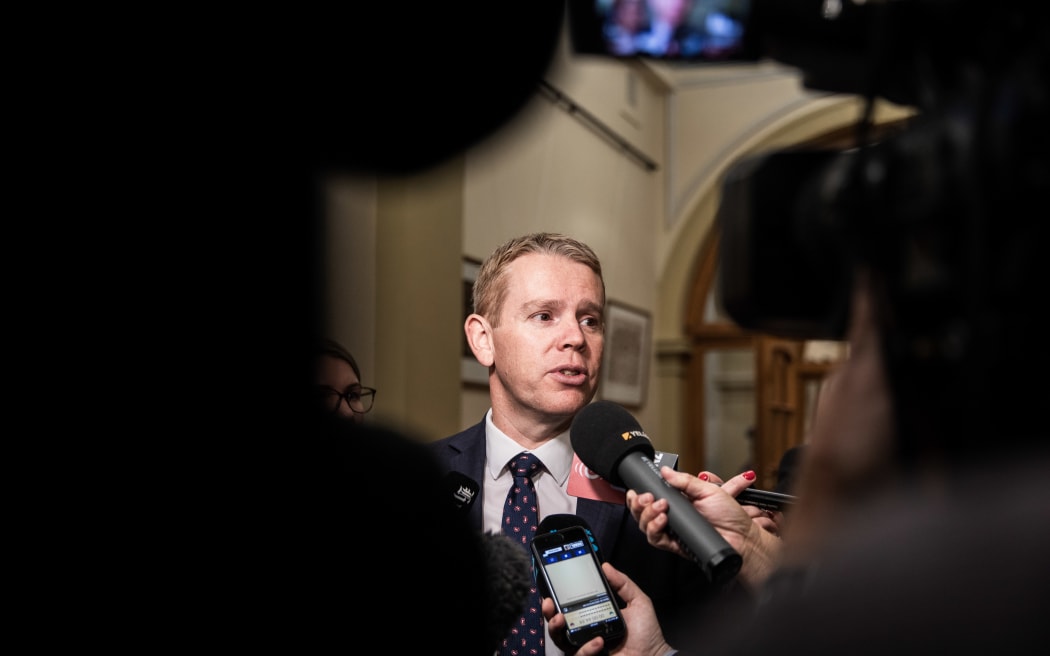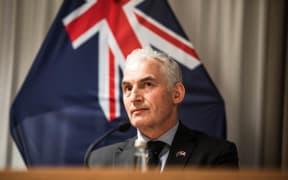Prime Minister Chris Hipkins has announced several steps towards greater transparency around the lobbying that happens at Parliament.
He is setting out four changes. The first is a significant piece of work to look at policy options for lobbying regulations.
The moves follow a series of reports by RNZ's Guyon Espiner examining lobbying in New Zealand politics.
"It is important that we have a sensible and transparent system that doesn't give the impression that lobbyists enjoy unfair advantage over other New Zealanders."
"To do it well, that will require consultation and a good amount of time. I anticipate that advice will come back to government next year."
It was last looked at in 2012 and did not progress because, he said, "it was too broad in scope and also because the majority of the Parliament did not agree to it".
He wanted to learn from that previous process, but in the meantime there were three other measures he expected could take place relatively quickly.
The first is to remove swipe card access to the Parliamentary complex from lobbyists.
"Currently some lobbyists as well as business and union representatives have swipe card access to the Parliamentary complex. My view is they should go through the front door like every other New Zealander."
Swipe card access did not actually give lobbyists any guaranteed extra access, he said, but "symbolically it is something that has been picked up on and noted, and it certainly gives the perception of increased access".

Chris Hipkins Photo: RNZ / Samuel Rillstone
He said that was not his decision to make, but he had written to Parliament's Speaker Adrian Rurawhe to express the government's view this access should be removed. Hipkins wanted this to be a bipartisan issue and called on other parties to support the move.
Hipkins believed "80-something" people currently had swipe card access.
He was also calling on third-party lobbyists to develop a voluntary code of conduct that would help enhance transparency - for example by publishing the names of their clients on their websites.
"Others involved in lobbying - for instance peak bodies, industry associations and other entities could also sign up to the voluntary code."
He said the government would offer assistance from the Ministry of Justice to help draft the code and draw on overseas and best practice, if that was wanted by the industry.
Finally, a refreshed Cabinet manual will be published later this month which will make clear "ministers' conduct and decisions should not be influenced by the prospect or expectation of future employment with a particular organisation or sector".
He said further work on this could come as a result of the broad ranging review.
A cooldown period - a ban on going straight from government to lobbying within a certain timeframe - was another option that could be explored, Hipkins said.
However, it would need work to set out the specific definitions so people were not prevented from taking up some public office roles because there could be some "interaction" with the law.
"Someone who might leave Parliament and take up a job as say a chief executive of a non-government organisation that has a relationship with government - that's not so clear cut."
He said there was also an opportunity to ensure it was fair, implementable, and draws on best practice to make sure it was done properly.
"There's a gap here and ... we should look at it.
"In terms of the work of paid lobbyists, most of that interaction would be at the more informal level and it's very hard to control against - because you see people at events, they'll talk to you - but in terms of direct engagement on issues that someone might be paying them a fee to represent their views on, I haven't had a huge amount of exposure to that."
New Zealand should rightly be proud of its open and accessible government "but I also know that New Zealand is a bit of an outlier internationally in our [lack of] regulation of lobbying, and I hope that these measures will go some way to further increase the confidence New Zealanders can have", Hipkins said.
Nash review
Hipkins confirmed he spoke to Nash on multiple occasions to ask whether there was anything else he should have known about.
This suggested Nash was "either holding it back or he may have genuinely forgotten it, but either way the existence of that email was the thing that meant that I made the decision that he could no longer continue as a Cabinet minister".
"The end point for me as prime minister ... would have been the same. He would not have been a minister either way."
Hipkins was also releasing terms of reference for the review announced last week into Stuart Nash's ministerial communications with donors. It will be carried out by the secretary of Cabinet and is expected to report back within two months.
"It will look at whether there were any other breaches of Cabinet collective responsibility or confidentiality, or perceived or actual conflicts of interest in communications he had with people and entities who made declared donations to his 2017 or 2020 electorate campaigns.
"Communications that are in scope include those of letter, email, text message, WhatsApp or Signal, between the 26th of October 2017 and the 28th of March 2023 when Mr Nash held ministerial portfolios."
The date range for the terms of reference of the review of Nash's communications was limited to donations he received when he was a minister, or shortly prior to becoming a minister, Hipkins said.
Asked why Nash's communications with Labour Party, rather than electorate campaign, donors were not in scope, he said there was "no evidence to suggest that has happened, and again this is about making sure we're getting a result in a relatively short period of time".
"If I wasn't worried at all we wouldn't be having this conversation ... clearly there is a perception here and a reality too that the rules haven't been followed. And so making sure we're getting to the bottom of that is important."
Hipkins said he thought the recent writing about lobbying "highlights a legitimate issue that we should do more work on", but it was not directly related to the events surrounding Nash.
Hipkins said it was Nash's decision to stand down.
"We did have a conversation about it last week and I did make it clear that it was his decision to make and his decision to communicate, and he's done that."
He said he respected the decision and "I wish him well".
Ardern to give valedictory speech
Jacinda Ardern is set to give her valedictory speech this week. Hipkins said she led New Zealand "exceptionally well through some amazingly complicated challenges".
"I think New Zealand is a better country for her leadership. Not many prime ministers in five years in office would have to deal with as many significant challenges as Jacinda Ardern did - from a volcanic eruption, a terrorist attack, a global pandemic.
"The pandemic alone I think would be one of the biggest challenges any New Zealand prime minister has faced during their time in office and I think Jacinda Ardern led us through all of those with dignity, with humility, she had high levels of trust from New Zealanders during that period with good reason.
"As she leaves Parliament I'm sure and I hope she would leave with her head held high knowing that she's given her all to what is a tough job."
He hoped people would leave her alone and let her get on with what she does next.
"She's given a lot to New Zealand and has now stepped back from that. And I think the vast majority of New Zealanders already respect that and I would hope those who are on the fringes and haven't always perhaps respected Jacinda or the office that she held I would hope that they would back off now as well.
"I don't know how she's found things in the last couple of weeks."
He said being prime minister was a tough job and people should understand it was tougher for Ardern as a young woman, "given that she was subjected to a much greater degree of scrutiny than men have been in the same job, a much greater degree of vitriol than men have been in the job".






